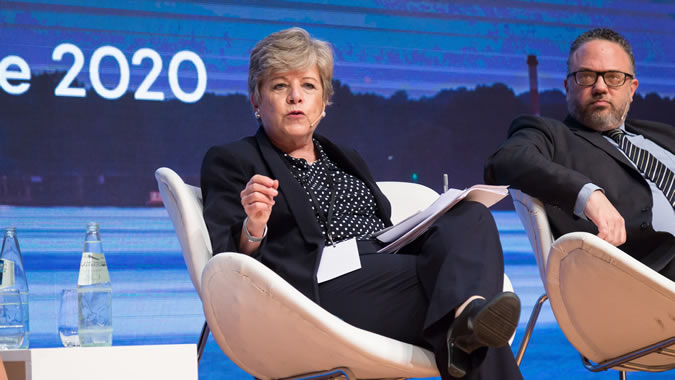We Must Move Towards a New Vision of Development that is More Innovative, Diversified and Inclusive: Alicia Bárcena
Work area(s)
ECLAC’s Executive Secretary spoke at a CAF seminar on the challenges of growth in Latin America.

The Executive Secretary of the Economic Commission for Latin America and the Caribbean (ECLAC), Alicia Bárcena, urged the region’s countries to think about development in a different way to move towards a more innovative, diversified and inclusive vision, during a high-level event held today in Buenos Aires, Argentina.
ECLAC’s highest authority was one of the main speakers at the seminar “Challenges for growth and development in Latin America,” organized by CAF-Development Bank of Latin America, in conjunction with the Argentine government.
Bárcena participated on a panel about challenges related to investment and trade in a globalized world, along with Matías Kulfas, Argentina’s Minister for Production Development; Héctor Alexander, Panama’s Minister of Economy and Finance; Humberto Colman, the Deputy Economy Minister of Paraguay; and Cecilia Nahón, Argentina’s Representative at the World Bank.
In her presentation, Alicia Bárcena reiterated that the re-primarization of economies is not the path to follow. “We have to move to a diversification of production. We need to rethink the vision for development, since each country in the region is distinct. We must think about development in a different, innovative, diversified and inclusive way,” she sustained.
In addition, she stressed the importance of regional integration, above all in the current context, characterized by low growth and a decline in investment, which has led to 18 of 20 Latin American economies decelerating their pace of expansion in the last few years.
“We are not doing things well in this area. We only have 17% of intraregional trade on average. The region that has the most trade internally is Central America, which is above 30%. Integration must be pragmatic, moving towards much more effective models of production integration. Here, MERCOSUR has a major opportunity to lower costs through the facilitation of trade and customs exchange,” she said.
“The backdrop in Latin America is not poverty, it’s inequality. The redistribution of wealth is a pending matter in Latin America. We must search for a way to create new-generation social policies through, for example, new redistributive taxes that are levied on the richest 1% of the population. We must dismantle the culture of privileges, redesign social policies with a focus on redistribution, and change the conversation between the State, the market and society,” Bárcena added.
“In countries like Chile, the wealthiest 10% has 26 times more income than the poorest 10%; in some Central American countries, that difference is 70 times greater. People are disenchanted for that reason, because the culture of privileges has not been dismantled,” she stated.
The senior United Nations official also mentioned tax evasion as one of the great obstacles hindering development in the region. “Latin America and the Caribbean cannot continue with current evasion levels, which total 6.3% of regional GDP ($640 billion dollars). This is not even comparable with what we spend on social protection or integration. If the region does not come into agreement to control evasion, it will not be able to make much progress,” she warned.
Bárcena also referred to the debates that took place at the last World Economic Forum in Davos, Switzerland (in January), reiterating that a crisis of capitalism is under way. “As discussed in Davos, we must move from a capitalism of shareholders, to a fairer and more inclusive capitalism of stakeholders,” she indicated.
Finally, with regard to integration, ECLAC’s Executive Secretary highlighted the importance of energy issues, above all for South America, where the great challenge lies in the infrastructure for electric power transmission. She explained that this problem was successfully overcome in Central America, which has the best infrastructure system in the region. “This challenge must be the number one priority for MERCOSUR,” she asserted.
Furthermore, South America is the region with the greatest lithium reserves, in Argentina, Chile and Bolivia. For that reason, Bárcena insisted that a platform should be created to produce lithium batteries – rather than selling the unrefined mineral – since these electrical batteries will be the key input for the electromobility emerging as one of the primary transportation trends worldwide.
Subregional headquarter(s) and office(s)
Type
Country(ies)
- Latin America and the Caribbean
Contact
Public Information Unit
- prensa@cepal.org
- (56 2) 2210 2040